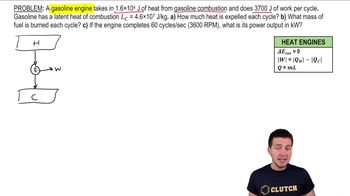Here are the essential concepts you must grasp in order to answer the question correctly.
Power Output
Power output refers to the rate at which energy is produced or consumed. In this context, the Boeing 777 jet engine has a power output of 82 MW, meaning it converts fuel energy into mechanical energy at this rate. Understanding power output is crucial for calculating fuel consumption, as it directly relates to how much energy is needed to sustain the engine's operation.
Recommended video:
Power Output of a Gasoline Engine
Energy Density
Energy density is a measure of how much energy is stored in a given mass of fuel, expressed in units like MJ/kg. For jet fuel, the energy density is 43 MJ/kg, indicating that each kilogram of fuel can release this amount of energy when burned. This concept is essential for determining how much fuel is required to produce a specific amount of power over time.
Recommended video:
Efficiency
Efficiency in this context refers to the ratio of useful energy output to the total energy input, expressed as a percentage. The engine's efficiency of 30% means that only 30% of the energy from the fuel is converted into useful work, while the rest is lost as waste energy. This concept is vital for calculating the actual fuel consumption rate, as it affects how much fuel is needed to achieve the desired power output.
Recommended video:
Efficiency of a Nuclear Power Plant




